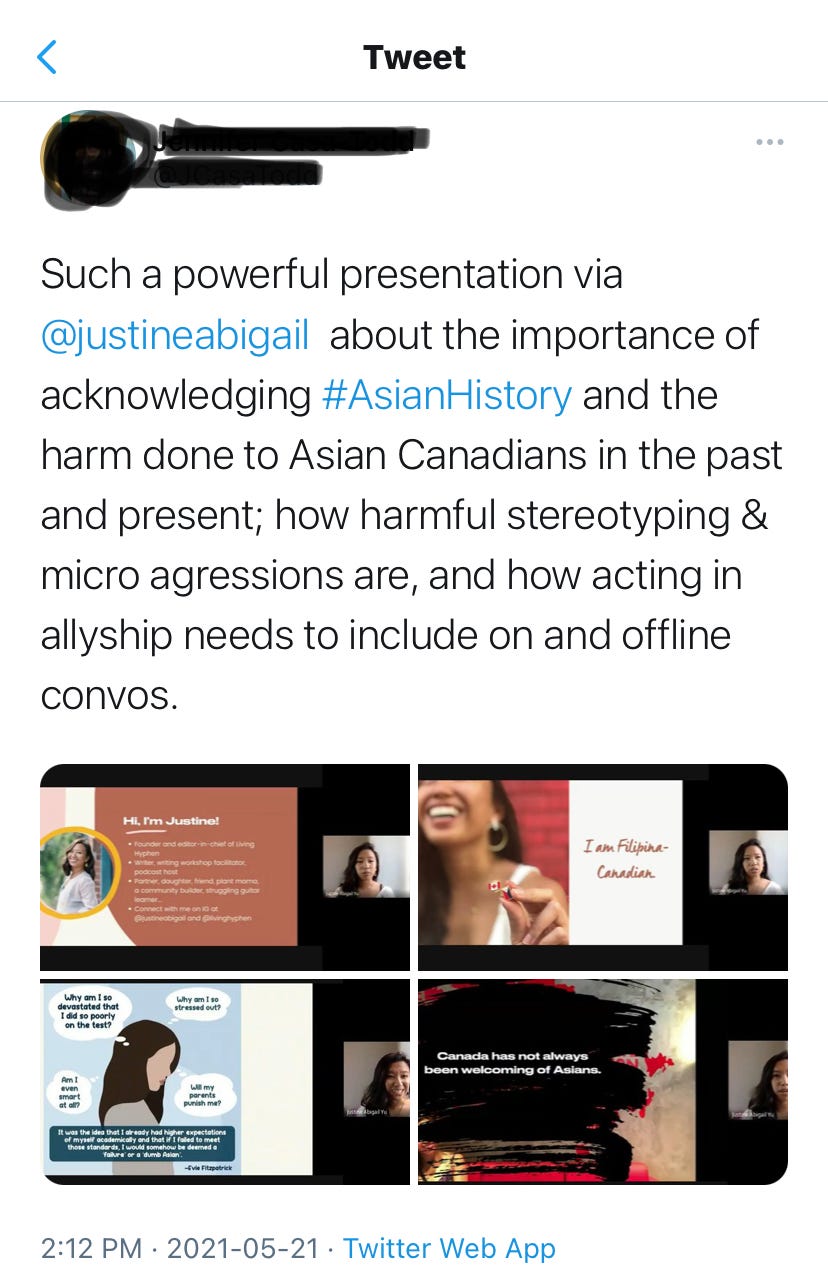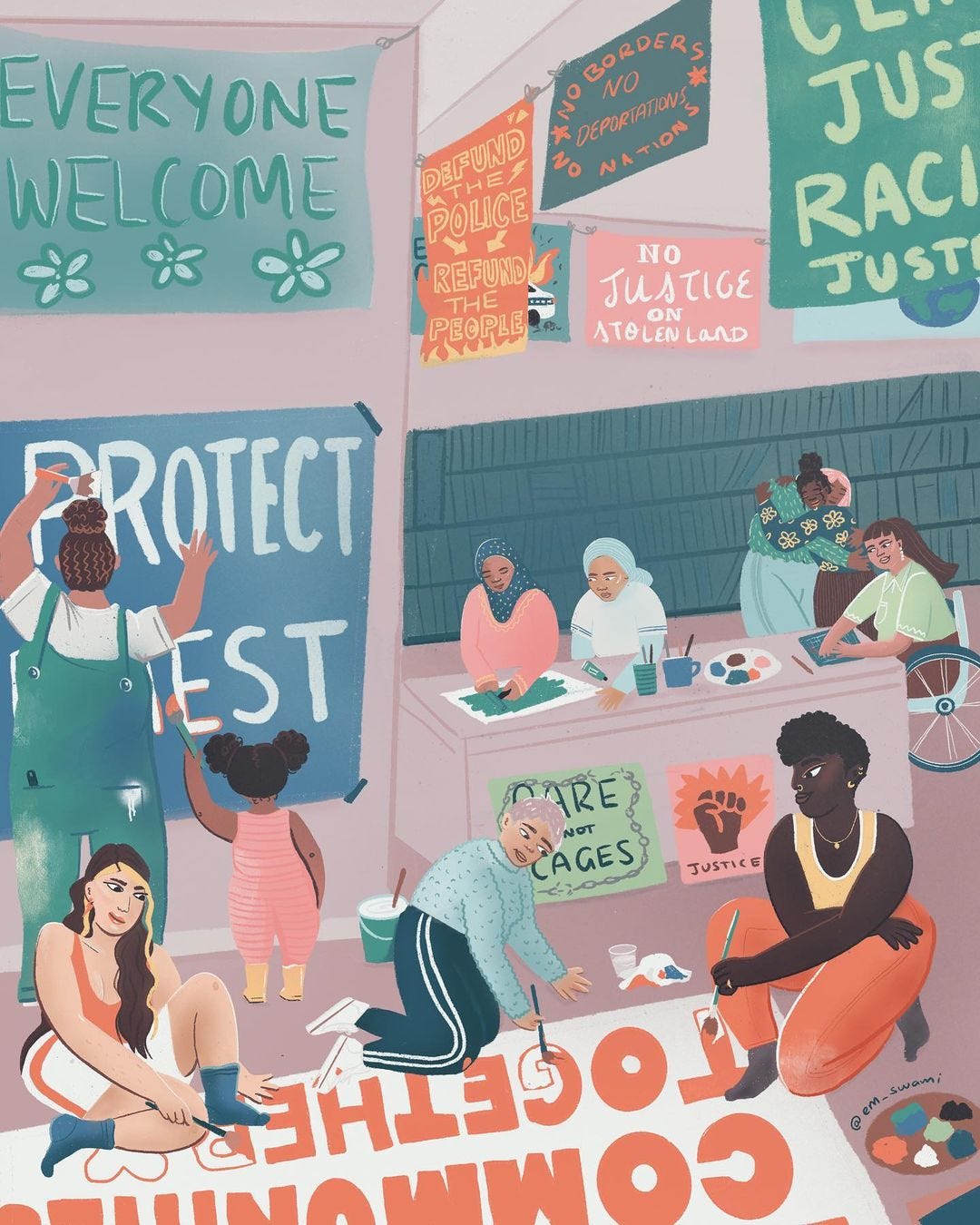Hot Take: Why Cultural Heritage Months Can Be Damaging And Harmful
On the Mentality of Scarcity as A Tool of Oppression
Hello friends!
It’s Black History Month and while I’m sure your inbox and social media feeds are full of features on significant Black leaders (at least I hope it is!), I wanted to go a little bit deeper here with this month’s newsletter. This might be a hot take, but I hope by the of this email, you understand my point of view and how I’d like to challenge us to stretch our minds.
You see, it has never sat well with me that we celebrate these holidays for particular cultures or “minority” groups on specific days of the year – or months, if you’re lucky or large enough of a population. Black history in February. Women’s history in March. Asian heritage in May. Pride in June. National Indigenous History Month in June. Filipino heritage…again in June. Latin Heritage Month in October. And the list goes on…
While the creation of these holidays may have been well-intentioned and a symbol for progress at the time, the reality is that it can largely be performative and more often than not, limits us to the bare minimum.
It encourages all of us to learn of these histories, heritages, cultures, and communities only during these specific times of the year instead of all year round as an integrated part of our educational curriculum and our collective consciousness. It’s lazy at best, and deeply harmful at worst.
It’s harmful because these cultural heritage months subtly reinforce the mentality of scarcity that plague so many of us who are part of these underrepresented communities.
It teaches us that X month is our month to speak out and stand up. That we must only take up space during those allotted weeks. No more, no less.
And heck, we should be grateful to even be given this time.
What I find to be the most harmful though is that this mentality of scarcity signals to us that we are in competition with one another. In June alone here in Canada, we celebrate Pride, we celebrate National Indigenous History Month, and in more recent years, we celebrate Filipino Heritage Month.
There are only so many months in the year and it feels like we must compete for airtime. We must jostle at each other for recognition of our very worth and value.
Even in these months that are meant to honour our communities and our contributions, we are still playing by the rules of someone else’s game. Remaining within the distinct lines that they created.
How powerful these systems of oppression work! So subtle, so smooth, so damn sophisticated…
I have come to dread May and June because of all the contradictions and conflict it brings up within me.
Again, here in Canada, we celebrate May as Asian Heritage Month and June as Filipino Heritage Month – two communities of which I am proud to be a part. Don’t get me wrong, I love seeing my community coming out and sharing our rich heritage, our vibrant culture, and our undeniable excellence in full force during this time (though we do it all year-round, really).
Each year during this time, I get inundated with requests to speak on behalf of my community and/or to facilitate my writing workshops to uplift and inspire students from these communities. It’s wonderful, of course! And I will always welcome the opportunity to share my work and to speak on the complex and nuanced issues that affect us.

But at the same time, it can be frustrating. How I wish the desire and urgency to hear my voice, my story, and my insights were present steadily throughout the year and not dictated by a government-recognized month. How I wish the impetus for hiring me wasn’t just to tick off diversity and inclusion calendar requirements.
I am always left feeling the impulse to say yes to absolutely every opportunity that comes my way during these months because well, the opportunity might not present itself again. Isn’t that sad?
I know that heritage months have been integral to raising mainstream awareness about various communities that have shaped our society. We needed them at the time. But I think we are ready to move beyond this limited mentality, this mentality that reinforces scarcity in racialized and marginalized communities.
If there is anything my work at Living Hyphen has taught me, it is that there is infinite space for all of us. We don’t need designated months to recognize and celebrate each other’s humanity. We can hold all of our truths, all of our identities, all of these complexities at once and at all times.
And so today, and every day, I challenge you to break past the narrow idea of heritage months and the limitations these systems of oppression have built and continue to foment in each one of us.
Let’s make learning about each of our communities and cultures a part of our everyday exercise.
We must move beyond heritage months to fully recognize how interconnected all of our histories, futures, and current struggles and triumphs actually are. We must hold and carry multitudes.
I know we can.
In solidarity,
Justine
Additional Resources:
Have you checked out Living Hyphen’s anti-racism resources? It’s a living resource and an ongoing work-in-progress that we create together and in community to dismantle white supremacy and work towards our shared liberation. Go through it yourself and share widely!
Paulo Freire’s Pedagogy of the Oppressed is an absolute must-read and foundational text for understanding how systems of oppression function in our society and how we might break free from its bonds.
Audre Lorde’s Sister Outsider is a collection of essays unraveling the power dynamics that lie within and between race, gender, and sex. It’s one of my absolute favourite books and you’ll likely find me quoting from this text often in these newsletters!
What’s Happening in My World:
ICYMI: I started a new blog, I Was Wrong(ed), capturing the moments that I have been wrong or that I myself have been wronged when it comes to social justice and anti-oppression. I’m creating this space as a way to move beyond the discomfort of failure in our conversations around social justice and anti-oppression and instead, normalize failure in our discourse. Read on!
I’m so excited to share that Living Hyphen will be hosting its first writing workshop facilitated by a guest instructor! Andrea is an Afro-Canadian writer, award-winning spoken word artist, and thoughtful educator who will be leading us through Soul Speak: A Spoken Word Writing Workshop! Learn more and register here.
Andrea will also be reading from her latest collection, A Selected History of Soul Speak, recently released by Frontenac House. Get 20% off when you use the promo code LIVINGHYPHEN. Thompson’s collection blurs the space between public and private while excavating the influence of Black North American history, art, and culture on contemporary poetics. From the slave songs and spirituals of the cotton fields of the Old South, to the smoky coffee houses of the Harlem Renaissance, to today’s slam stages and rap battles, these poems elevate the written and spoken word as vehicles for individual empowerment, collective agency, and social justice.
I’ve been reading Mariame Kaba’s We Do This 'Til We Free Us, a collection of essays about abolitionist organizing – that is, seeking justice beyond the punishment system. I’m learning so much about transformative justice in a way that is rooted in collective care and relentless hope.
Support My Work:
If you enjoy reading this newsletter and find the work that I do valuable, you can support my work by supporting Living Hyphen, the community I founded to explore the experiences of those living in between cultures. You can do that through a number of ways:
Support racialized writers in financial need with a one-time contribution. Your contribution will go to our scholarship fund to offset the cost of a ticket to our writing workshops.
Make a monthly contribution on Patreon to support our ongoing programming.
Support storytellers from 60+ ethnic backgrounds, religions, and Indigenous nations from all across Turtle Island by reading our magazines or listen to our podcast!
Follow Living Hyphen on Instagram, Twitter, and Facebook, and engage with us on social media.



